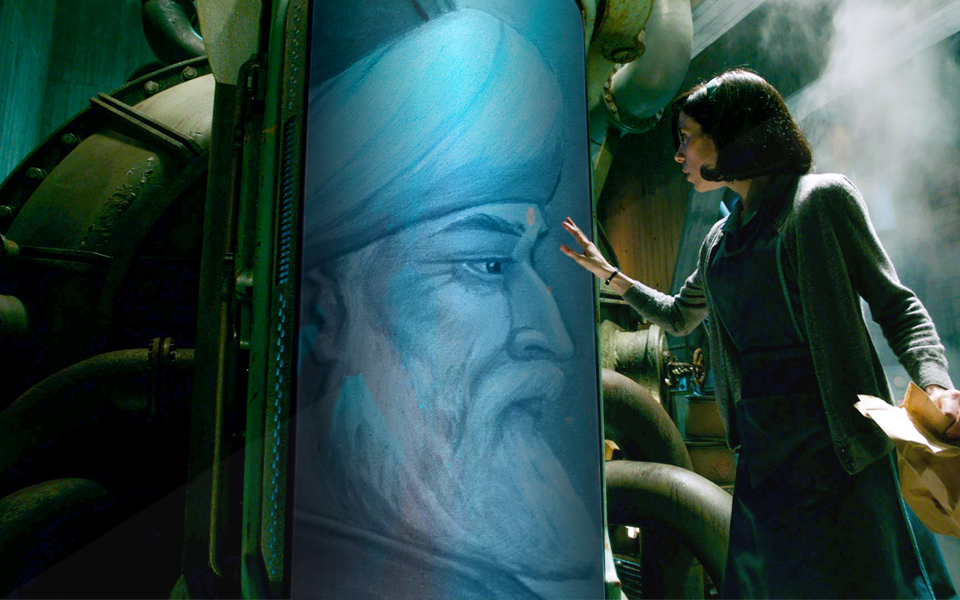Roger Tagholm
Guillermo del Toro’s Academy Award-winning movie The Shape of Water, which won Best Picture at the Oscars earlier this month, may have connections with the Holy Qu’ran.
A touching allegorical story of a mute cleaning lady’s love for an other-worldly aquatic creature, one memorable scene includes this poem, spoken by an unseen narrator: ‘Unable to perceive the shape of you/I find you all around me/Your presence fills my eyes with your love/It humbles my heart/For you are everywhere’.
Ever since the movie’s release, there has been much speculation as to who is the author of these words. The Library of Congress in Washington DC received a number of enquiries and two researchers began a piece of literary detective work. The Library could find no exact match on its extensive database and though many sources attributed the line to the 13th century Sufi mystic poet, Rumi, the researchers could not find any verification of this, nor could they find the poem itself.
Other sources mentioned another Sufi poet, Hakim Sanai, who was born in Afghanistan in the 11th century and who Rumi acknowledged as one of his influences. Some also claimed it was written by the Byzantine monk, Symeon the New Theologian (942-1022 AD), but once again the researchers could not find the poem itself.
Their investigations turned to comments made by del Toro in various interviews. In a conversation in December last year, the director said: “We were already shooting the movie and it was the first week of the shoot, and I always arrive an hour or two before the crew to the set and I was a little earlier than that. Then my driver says, “What do we do?” When I have any free time, I say “Let’s go into a bookshop.” So we went to a bookshop, and I was browsing the shelves. I found this poem in a book about an illuminated poet talking about Allah, talking about God. I thought it was so magnificent. It moved me very much, and I bought the book.” In another interview, he described the poem as “a love letter to God”.
Since the name most often mentioned was Rumi, the researchers spoke with Brad Gooch, author of Rumi’s Secret: The Life and Times of the Sufi Poet of Love. Gooch said: “Rumi wrote over three thousand ghazals, and two thousand robaiyat, which are lyric poems akin to sonnets and quatrains. Many have not been translated. Many have been extraordinarily loosely translated. Often lines are attributed to Rumi that are simply not by Rumi. Those lines [from the film] indeed do sound like Rumi, but they could have been written by a Sufi poet of the time under the influence of Rumi or of the general poetic thinking of the time, or someone later under the influence of either [or both].”
Next they contacted Fatemeh Keshavarz, Director of the School of Languages, Literatures, and Cultures at the University of Maryland, College Park, and Chair and Director of the University’s Roshan Institute for Persian Studies. He said that “the quote does not remind me of any particular verse of Rumi,” but added that it does include key concepts and themes of Islamic lyric poetry and Rumi’s own work. “The concept that the beloved’s shape is not to be perceived by the lover because the beloved is omnipresence has become a universal love theme in Islamic lyric poetry because the concept is expressed in the Qur’an. Since Rumi is the best know Muslim mystic, at this point, I am not surprised that it will be attributed to him. Also, I have no doubt that if we sifted through his lyric poetry corpus, we will find many lines evoking the shapelessness and the omnipresence of the beloved.”
Dr. Keshavarz pointed to two verses from the Qur’an which include these ideas: “Wherever you turn is the face of God” (defined as the beloved or the truth by the Sufis).” – Qur’an 2:115, and “He is the beginning, the end, the outer and the inner.” – Qur’an 57:3.
Peter Armenti, literature specialist for the Digital Reference Section at the Library of Congress, concludes: “The most likely scenario is that the poem in The Shape of Water is an adaptation of a poem del Toro read in a book of Islamic poetry he found at a bookstore. Del Toro may have had the book in hand when adapting the poem, or may instead have relied on his memory of the poem’s text. The poem he adapted was likely written by an Islamic lyric poet, perhaps in Arabic or Persian. While the poem could have been written by any of a number of Islamic poets operating in the lyric or mystic tradition given the poem’s common theme, Rumi has quickly become the leading candidate….”
Which leaves this question: is there still an opportunity for a publisher to produce a film tie-in edition called The Shape of You, which includes the poem from the film and other Islamic love poetry?







